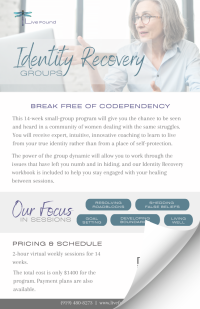Misplaced Responsibility in Relationships
I’m going to make a statement that might initially cause a strong reaction in you, but please hear me out. Ultimately, my goal is to find that precious, sacred, powerful point at which we become intentional about living, even in the midst of a destructive, stifling world. It is at that point where we have the God-given agency to make a choice about our next step, and about who we are and how we are showing up. The hardest question to answer is: How? When I’m stuck within the circumstances, how do I get out? What steps can I take to break free of the strongholds that are destroying me/us? How do I come out of hiding with strength, courage, and a steadfast heart? How do I show up well?
Misplaced Responsibility Defines Both Narcissism and Codependence
So, here’s the thought-provoking statement: Both narcissism and codependence find their strongest footing (the foothold, if you will) in misplaced responsibility.
Both extremes rely upon an external frame of reference to determine their next steps. That is, they rely on what other people, the circumstances, the belief systems, and what’s been done to them to determine how they show up in the world. It takes great courage, bravery, and maturity to take steps based upon who they authentically are, and so they resort to complacency… and, ultimately, to the destructive behaviors that ruin friendships, lives, marriages, and families.
Both ends of this spectrum make excuses for behavior based upon how they view the world acting upon them, rather than view it based upon how they can act upon the world. Those on the narcissistic end do so by using anger and arrogance to control and subdue what they fear. Those on the codependent side use false-peace-making to control and subdue what they fear. Both sides are in hiding and blame the outside forces for their inability to change. They place the responsibility for their internal world fully on the shoulders of the external world around them… and thus do not take responsibility for their own thoughts, behaviors, and feelings.
The hard part is that, in taking responsibility for what is ours to manage, it does not necessarily make the harm from the outside world go away. Navigating that harm steadfastly and with good boundaries is another discussion for another time.
Examples of Misplaced Responsibility
According to answers.yahoo.com, displacement of responsibility is when someone blames others for their shortcomings. Like when someone is caught with drugs, they blame their bad home life or the people they hang out with. The person doesn’t see their own culpability therefore they can’t change what is in them that is causing their downfall.
Other examples relevant to our niche of clients:
- Someone is caught in an ongoing affair and porn addiction, and blames it on the stressful job and unwillingness of his wife to “meet his needs.”
- Someone who verbally abuses his wife because she doesn’t agree with him, holds opinions/beliefs different than his, or confronts him.
- Someone who shows great compassion and leadership to those outside of the home but is a jerk to their spouse and children because they are annoying and loud, or didn’t comply in some way; or because he’s stressed from all the “work” outside the home and needs a place to “let it out.”
- A person who goes along to get along because their spouse is always oppositional and dismissive but becomes increasingly better at shutting down and hiding their heart from him/her.
- The person who does everything in his/her “power” to “make her/him/them happy” so that those other people are not angry (thus a higher likelihood not to harm), but effectively enables the anger.
- Not saying what you think, feel, or need because the other person argues over how you presented it and belittles you for thinking, feeling, or needing.
The Myth of Victim Mentality
The idea that we are simply victims of our circumstances makes for an easy excuse for destructive behaviors, some of which are covertly self-destructive. Again, considering both The Narcissist and The Codependent, the extremes are ultimately grounded in hiding and self-protection. Both try to get what they want in controlling, manipulative ways in order to protect themselves and find security. There is a prevailing myth that hiding who we really are will mean safety, security, and love. And THAT is where the self-destruction is relevant: We are not meant to be alone, but when we hide ourselves, we are ultimately responsible for our aloneness.
Responsibility Deficit Disorder and Victim Mentality
There is an unconfirmed/unofficial diagnosis named Responsibility Deficit Disorder. According to Paul E. Olsen, MS:
Criteria that distinguishes someone who has been diagnosed with this debilitating condition:
- The inability to realize that only the choices one makes now determine the quality of one’s life -not mom’s impatience, dad’s alcoholism, the teacher’s demanding behavior, nor the boss’ criticism.
- Relentlessly blaming other people, circumstances, the stars, the position of the moon, or the month of the year in which you were born for your feelings and your lot in life.
- The belief that by being irresponsible, one’s relationships, jobs, and dreams can be fulfilling and fulfilled.
- The unfounded and unrealistic belief that by trying to change others, rather than self, life can be happier or more rewarding.
- A disbelief in the fact that what we think (what we tell ourselves) is the cause of our emotional problems (except for rare cases of chemical brain malfunction or brain damage).
(Olsen, Paul E. (1996). Responsibility Deficit Disorder. [Online]. Perspectives. [1996, November 15].)
Characteristics of Victim-Oriented Thinking
Dr. Robert Leahy, PhD and director of the American Institute for Cognitive Therapy, has named these characteristics of victim-oriented thinking:
- You feel powerless, unable to solve a problem or cope effectively with it.
- You tend to see your problems as catastrophes.
- You tend to think others are purposefully trying to hurt you.
- You believe you alone are targeted for mistreatment.
- You hold tightly to thoughts and feelings related to being a victim. You also refuse to consider other perspectives for how to think about and cope with your problems.
- As a victim, you feel compelled to keep painful memories alive, not forgive, and take revenge.
Moving Beyond Misplaced Responsibility
The point I want to make is this: We do have many valid reasons for doing what we do, but remaining in a victim mentality, regardless of whatever label we give it, we become obstacles to our own healing. Our circumstances do not preclude taking responsibility for our own behavior.
There are benefits to maintaining a victim mentality! It feels less vulnerable to point fingers when something goes wrong. It takes a different kind of courage to think and take action; courage that is much more confrontational than the kind used in passivity and hiding. When the outcome is “bad,” it is nice to think the blame was on someone else. Changing ourselves is hard!! And there seems to be too much at stake.
Taking responsibility for who you are and how you show up in the world does not condone someone else’s behavior, even when it is in response to something they’ve done. Stopping the abuse/control cycle doesn’t have to depend on the other’s cooperation or affirmation. And, your healing doesn’t depend upon their cooperation either! (The relationship does, but that’s another topic.) Refusing to be driven and tossed by people and circumstances requires your choice to do so and action to make it happen – managing your sense of personhood in a broken, dangerous world.
Embracing Responsibility for Healing
If we truly want healing, we will have to put down the pointing finger and start putting more emphasis on our own responsibility to show up who God has designed, purposed, and called each of us to be. We are responsible for the person – ourselves – we are inviting others to relate to.
What this does not mean:
- Staying in abusive, destructive relationships or marriages without boundaries.
- Going along with/enabling/putting up with anything harmful/destructive/debilitating.
- Rescuing someone else from their own bad behavior.
- Making the healing of your heart be dependent upon another person’s change.
- Forcing anyone to be/do what you want them to do.
- Powering over others, taking away their voice and personhood.
- Being a bully who barrels through life not caring or noticing how you affect others.
- Being silent, compliant, and complacent.
What this DOES mean:
- Building relationships to include freedom, reciprocity, and mutuality as God designed.
- Walking in your calling, a churchy term to mean showing up in the world in the way you know God has instilled in you.
- Living life actively, intentionally, and taking greater action to manage what you participate in.
- Bringing greater authenticity to the table, which correlates highly to greater, deeper connection.
- Courage feeding courage to prove wrong the fear that has held us captive in isolation and hiding.
Next Steps for Personal Growth
We would love to help you sort out the ways you may inadvertently be self-sabotaging your healing and strength. Whether it’s individually or in the context of a relationship, our expert coaches can be a sounding-board for the random confusion going on in your head.


